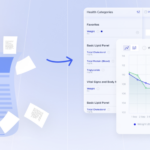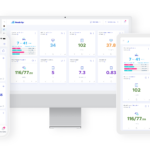Setting Yourself up for Success
Whether you’re ready to dive into the ketogenic diet for the first time, or you’ve tried it in the past and didn’t achieve the results you’d hoped, this article is for you! Using your genes for your methylation status, digestion and to help you avoid metabolic syndrome, we walk you through Sarah Morgan’s work in using your genetics to optimize the keto diet for you.
Genetics, through the study of epigenetics, can provide a framework for understanding why we react to our food and environment in a certain way, and why the same diet produces different results in individuals. Why do some people do exceptionally well from the beginning with a ketogenic diet while others struggle? Well, genetics may play a large part in that.
Due to the large increase in the quantity of fats consumed on the ketogenic diet, some people may struggle to be able to break down those fats and turn them into ketones for energy and brain power. It turns out that this is often due to several genes that affect how we process fats in our bodies.
Whether you want to focus on more of a traditional keto diet, a carnivore diet or a ketotarian diet, your success will come down to what your genes need to support them. So, you can see why knowing this information before beginning a dietary shift like this can be beneficial.
Just like you don’t have to fall victim to the keto flu with proper support, you also don’t have to struggle to get into ketosis if you know ahead of time how to navigate what your unique body needs.
The following genetic interpretations and information are based on the work of Sarah Morgan, the “Gene Queen.” (Make sure to check out her podcast episode). So grab your Nutrition Genome, 23 and Me or other genetic SNP report and learn how you can customize the keto diet based on your SNPs. Make sure to sign up to track your data with the Heads Up app (download in the app store for on-the-go tracking), where you can directly sync your blood test results with your food tracker, Keto Mojo, blood sugar, HRV, sleep and more.
Reading a Genetic Report
When interpreting genetic data, you will commonly see plus and minus signs next to the gene. The more plus signs you see, the more variants of that gene you have. Use the following to interpret them if they are not already labeled as such:
- -/- Normal or Wild Type
- +/- or -/+ Heterozygous
- +/+ Homozygous
# 1 Gene: PEMT
What it does: Makes choline to support liver functioning. The liver needs to converts fats to ketones, so this is super important with the keto diet for keeping the liver healthy and not bogged down processing the increased fat in the diet. Choline is also supportive of brain health for memory and cognitive ability.
Where to find it on your report: Methylation
Common symptoms associated with it/indicators for support:
- Anxiety
- Trouble with fats
- Pregnancy
- Nursing
How to support it: Eat choline-rich foods like egg yolks, Brussels sprouts, liver, and can also be used in a supplement form.
What labs to run to monitor its functioning: Liver function tests ALT and AST to monitor liver functioning and the potential need for additional choline in the diet.
# 2 Gene: FADS2
What it does: Indicates your ability to convert shorter chain omega 3 fatty acids to longer chain fatty acids, like EPA/DHA, which are critical for brain health. If you have one or two copies of this gene, you will need more fats from fish or supplemental support to get enough EPA/DHA for brain health, as you will not be able to convert enough of the shorter chain omega 3’s, (such as from plant sources like chia seeds, flaxseed, hemp hearts, etc.) for your brain’s needs.
Where to find it on your report: Digestion
Common symptoms associated with it:
- Metabolic symptoms
- Neurological symptoms
How to support it: Eat more fish or take a fish oil supplement
What labs to run to monitor its functioning: Check EPA/DHA levels to see what your status is based on your diet and ability to convert plant-based fats to DHA and EPA for optimal brain function.
# 3 Gene: FUT2
What it does: Plays a part in how well you absorb your fats based on the type of bacteria living in your gut microbiome. If you have one or two copies of this gene, then you’ll need to bring in more prebiotic rich food for your good gut bugs to feed on.
Where to find it on your report: Digestion
Common symptoms associated with it:
- Craving more veggies on a keto diet or not doing well on a carnivore diet.
- More inflammation, or increase in inflammatory blood markers in response to a higher fat diet.
How to support it: Eat more fibrous vegetables (prebiotics) to feed the good bacteria in your gut and increase levels of bifidobacteria, which also helps lower inflammation. You’ll need 25 different plant species per week.
CAUTION: Extremely restricted diets can be potentially detrimental, so use caution if you don’t have all of the information on how it will affect you before beginning a very restricted diet. Test, don’t guess, then monitor frequently in the beginning.
What labs to run to monitor its functioning: Comprehensive GI panel or Viome testing to see microbiome diversity as well as homocysteine, CRP, and Sed Rate to watch for inflammation.
# 4 Gene: ACAT
What it does: Allows your body to convert proteins and fats to ATP (energy). We make our body weight in ATP every single day, so we want to make sure we can get good energy from our fats and proteins when this is our primary source of fuel.
Where to find it on your report: Digestion
Common symptoms associated with it:
- Fatigue or hypoglycemia symptoms on a high fat or carnivore diet.
- Cholesterol goes up eating a high-fat diet.
How to support it: Eat a more vegetable-heavy form of keto and avoid carnivore if you have one copy of this gene, but especially if you have two copies. You are not a good candidate for a carnivore diet.
What labs to run to monitor its functioning:
- Cholesterol labs – Total cholesterol, triglycerides, LDL, HDL, and LDL particle cholesterol testing if budget allows.
- Liver Enzymes AST, ALT
- Hemoglobin A1c, to monitor blood sugar averages
- Fasting glucose, to monitor blood sugar levels
# 5 Gene: ADIPOQ
What it does: Relates to a hormone released in the intestinal tract when we eat foods, which has to do with how much insulin is secreted, affecting blood sugar, type 2 diabetes, etc. Those with this gene are more predisposed to metabolic syndrome.
Where to find it on your report: Digestion
Common symptoms associated with it:
- Insulin resistance
- Heart disease
- Increased risk of colon cancer
How to support it:
- Exercise
- Intermittent Fasting
- Omega 3’s to increase adiponectin secretion
- Turmeric
- Berries
- Ginger
What labs to run to monitor its functioning:
- Fasting insulin, to watch for insulin resistance
- Hemoglobin A1c, to monitor blood sugar averages
- Fasting glucose, to monitor blood sugar levels
- Daily monitoring of fasting glucose at home with Keto Mojo
- CRP to monitor for inflammation
# 6 Gene: SLC22A5
What it does: Picks up fats and shuttles them to the mitochondria to be burned as an energy source, which then goes through the digestive tract and is absorbed across the gut barrier. L-carnitine then picks up the fats and shuttles it to the mitochondria.
Where to find it on your report: Digestive
Common symptoms associated with it:
- Low energy
How to support it:
- Getting enough L-Carnitine in your diet or through supplementation if needed
- Adequate vitamin C intake
- Making sure you’re methylating well
- Adequate intake of amino acids
- Optimizing digestion
What labs to run to monitor its functioning:
# 7 Gene: PPAR Alpha
What it does: This plays a role in fatty acid metabolism and can make it difficult to get into ketosis.
Where to find it on your report: Digestion
Common symptoms associated with it:
- Difficulty getting into or staying in ketosis
- Problems in a cholesterol panel – HDL, LDL, triglycerides
- Hypoglycemia on a high-fat, low carb diet
How to support it:
- Exogenous ketones to get into ketosis
What labs to run to monitor its functioning:
- Watch cholesterol levels closely if homozygous and taking exogenous ketones. Total cholesterol, LDL, HDL and triglycerides.
# 8 Gene: ACSL1
What it does: Has to do with how well you metabolize saturated fats from animals like bacon, fat bombs from dairy, etc.
Where to find it on your report: Digestion
Common symptoms associated with it:
- Higher fasting glucose
- Insulin resistance
How to support it:
- Focus on getting your fats from plant sources
- Eat a more Mediterranean style keto diet
- Coconut oil is okay
What labs to run to monitor its functioning:
- Fasting insulin, to watch for insulin resistance
- Hemoglobin A1c, to monitor blood sugar averages
- Fasting glucose, to monitor blood sugar levels
# 9 Gene: APOA2
What it does: This runs an enzyme that regulates appetite. People with this gene who eat more fat, tend to be more hungry and consume more calories in a day.
Where to find it on your report: Digestion
Common symptoms associated with it:
- Weight gain with higher fat diet
How to support it:
- Exercise
- Don’t have a sedentary desk job
What labs to run to monitor its functioning:
- CRP to monitor inflammation
- Fasting glucose, to monitor blood sugar levels
- Liver enzymes, ALT, AST to monitor liver functioning
# 10 Gene: FTO
What it does: Relates to the hunger hormone ghrelin, which regulates hunger.
Where to find it on your report: Digestion
Common symptoms associated with it:
- Especially those who are homozygous (2 copies) may feel hungry all the time
How to support it:
- Don’t consume a high glycemic diet
- Pay attention to hunger signals
What labs to run to monitor its functioning:
- Fasting insulin, to watch for insulin resistance
- Hemoglobin A1c, to monitor blood sugar averages
- Fasting glucose, to monitor blood sugar levels
# 11 Gene: TCF7L2
What it does: Has to do with incretin hormone which relates to insulin sensitivity.
Where to find it on your report: Digestion
Common symptoms associated with it:
- Type 2 diabetes
- Weight gain
- Dysregulated insulin
- Carb cravings
How to support it:
- Be careful with your carbs. If homozygous, be REALLY careful with your carbs.
What labs to run to monitor its functioning:
- Fasting insulin, to watch for insulin resistance
- Hemoglobin A1c, to monitor blood sugar averages
- Fasting glucose, to monitor blood sugar levels
About Heads Up
Heads Up is an app designed to empower individuals who want to take a self-directed approach to managing their health. Instantly centralize your medical records, connect your favorite devices and apps (e.g., Oura, MyFitnessPal, Keto-Mojo, FitBit, Apple Health, MyMacros+, Withings and many more) and use data to optimize your health.
[maxbutton id=”9″ ]



















